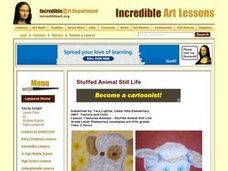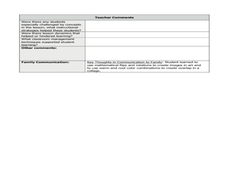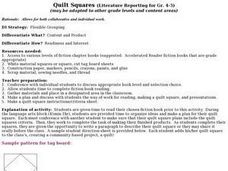California Education Partners
Colorful Data
Scale up your lessons with a performance task. Young data analysts work through an assessment task on scaled bar graphs. They answer questions about a given scaled bar graph on favorite colors, analyze a bar graph to see if it matches...
Curated OER
Mexican Folk Art: Sugar Skulls
Scholars use their knowledge of color to create vibrant skulls for Día de los Muertos. A thoughtful discussion brings forth information about the special holiday. A review of cool colors and warm colors prepares learners for the creation...
Pingry School
Liquid Chromatography
A hands-on experiment applies chromatography to separate both the colors and components of grape-flavored Kool-Aid. Performing two separate activities, learners first use chromatography to divide the colors. The second activity results...
National Wildlife Federation
Investigating Bat Adaptations
Bats may look the same, but are actually very different. Some bats eat meat and others fruit, while some have bright colors and others are dark colors. Learners examine the differences, view them as adaptations, and then play a game to...
California Institute of Technology
Physics of Light
Gummy bears are tasty, but did you know they are also used to determine color and light properties? Use the activity as a way to demonstrate light absorption, light reflection, and refraction with high schooler....
Curated OER
Textured Animals - Stuffed Animal Still Life
After posing their stuffed animals your young artists will sketch them in light colored chalk. After sketching, the second graders fill the animal with lines to show the fur, or texture of the animal. They put a shadow under their...
Shodor Education Foundation
Marbles
Grab some marbles from a bag. The applet simulates drawing marbles from a bag. Pupils determine the number of four colors of marbles in a bag and how many marbles to draw. Using information on whether order matters in the draw and if...
Curated OER
Word Search: Fish
Youngsters find these common tropical fish in this word search. Each of the fish has a colorful representation on the worksheet. There is also an answer key at the bottom of the worksheet. The colors make this an appealing exercise for...
Curated OER
Is Mr. Wolf Really A Bad Guy?
Is the wolf from "The Three Little Pigs" really big and bad, or is he just misunderstood? To analyze the effect of point of view, middle schoolers read Jon Scieszka's The True Story of the Three Little Pigs and evaluate the...
Curated OER
Studio Art Lessons Based on Latin American Arts
Study three of the basic principles of design: l) designs should create a rhythmic pattern made up of related shapes, 2) colors should be repeated so as to not force the eye to remain with a single part of the composition, and 3) a...
Curated OER
Understanding Symmetry Through Visual Art
Have your class explore symmetry, radial balance and fractional parts in natural and man-made objects in their environment. Learners list examples and identify symmetrical and asymmetrical designs. Pupils are given a box of crayons and...
Curated OER
Geometric Collages
Fourth graders investigate the concept of geometric patterning. They create their own patterns with a few basic requirements. The patterns must illustrate the concepts of flipping, 90 and 180 degree rotations. The collages also consist...
Curated OER
Altering Text Size, Color, and Font
Take a look at a very simple lesson on text size, text colors, and font choices. There is a step-by-step guide directing the young learners on what to do to change these things when working on a computer. Take it even further by adding a...
Curated OER
Fish Math
Students recognize things that are the same and things that are different. They use shape, size, numbers and color, for recognition. They make fish with different shapes/colors on them and 'fish' for the kind of fish that displays the...
Curated OER
Bugs Take Shape
Students investigate butterflies, moths, ladybugs and spiders looking at shapes, colors and patterns. They create a three dimensional bug using Crayola Model Magic, repeating patterns found in nature. They cut and shape the dough using...
Curated OER
Kente Cloth
Students examine colors, patterns, and meanings of the designs in a traditional form of weaving from Ghana called a Kente cloth. They create a replica drawing of a Kente cloth using paper and Crayola Overwriters Markers. Drawings can be...
Curated OER
Magnificent Mosaic
Students examine the ancient art form of mosaics. They compare and contrast mosaics from different cultures and time periods then create and design their own mosaics using Crayola Model Magic. They blend primary colors, or add white to...
Curated OER
Menus & Money
Students explore, examine and study how to strengthen their skills in writing, drawing and handling money at the same time. They assess how to open a pretend diner, pet shop or grocery store. Each student names their pretend...
Curated OER
My Fall Leaves
Here is a cute book on fall leaves designed for very young learners. In this four-page packet, pupils draw and color a variety of leaves in different fall colors. Each page is meant to be cut in half vertically, then the pages are...
Curated OER
Math Throughout the Day
Learners practice their number sense throughout the day. They practice their use and understanding of numbers in every part of the day. Students watch and listen to the teacher count students in class, sort themselves based on colors or...
Curated OER
Data Collection and Presentation
Middle and high schoolers collect and analyze data from four different activities. The activities include information about classmates, tallying colors of cars in a parking lot, stem and leaf plots, and making a histogram from...
Curated OER
Lesson: Beyond First Impressions
Just like the colors and techniques used to create a vivid image, learners will use exceptional language to create vivid stories. They examine the techniques used to tell a visual story in the painting, Road to Santa Fe. They then use...
Curated OER
Quilt Squares-Literature Reporting
Differentiate instruction with this crafty approach to demonstrating comprehension. Learners choose a fictional book at their reading level, and afterward create a quilt square. The square is "decorated" with words, illustrations, and...
Curated OER
Data Analysis and Froot Loops
Use this probability and graphing instructional activity to have your learners work with a partner to make a necklace out of Froot Loops. They record the cereal colors randomly chosen and strung, graph their data, then use a ratio...
Other popular searches
- Primary Colors
- Spanish Colors
- Warm and Cool Colors
- Preschool Colors
- Secondary Colors
- Mixing Colors
- Color Mixing
- Teaching the Primary Colors
- Colors and Shapes
- Complementary Colors
- Colors Conveying Mood
- Cool Colors























